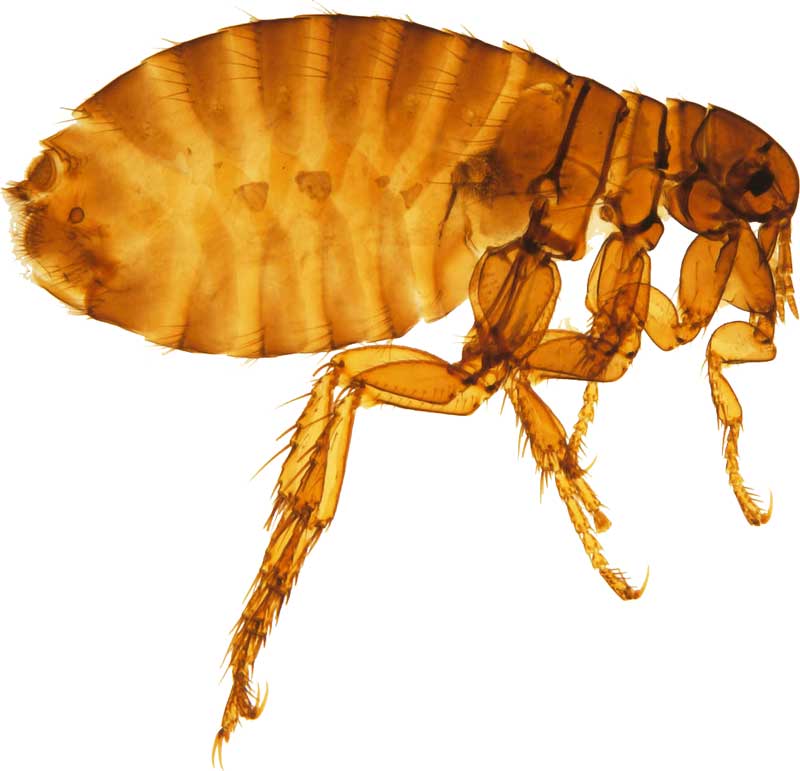What to Feed Dogs with Itchy Skin
November 03, 2020 | By David Jackson, AllAboutDogFood.co.uk

Itchiness is sadly extremely widespread in dogs, so common in fact that many dog owners think of it as just a normal part of their dog's life. But constant itching is far from normal - it is unpleasant and stressful for the dog, can quickly lead to skin damage, pain and infections and, in many cases, it is a sign of much bigger problems under the surface.
Identifying and removing the cause
Food and digestive health certainly play a major role in almost all skin problems, either directly and indirectly, but there may also be other factors at play so before jumping into elimination diets and herbal remedies, it's important that we first examine the other possible sources of skin irritation:
1. Pain
When a dog is in pain or discomfort, they can begin to lick or gnaw the affected area compulsively. When this is the case, the licking or biting is usually restricted to small areas and may be more pronounced at certain times of day - for example following exercise.
 Thorns or sharp rocks trapped between the toes or foot pads are a common culprit so if your dog has suddenly started licking or biting his paws, be sure to give them a thorough check for foreign objects or cuts. Thorns or sharp rocks trapped between the toes or foot pads are a common culprit so if your dog has suddenly started licking or biting his paws, be sure to give them a thorough check for foreign objects or cuts.
Dogs suffering from arthritis or hip/knee dysplasia might also start licking around the affected joints and for many dogs, hotspots (localised areas of skin inflammation and bacterial infection) can also cause significant skin irritation.
If you suspect that pain is causing your dog's skin irritation, consult your vet on suitable treatment options.
2. Parasites
 As you might expect, fleas, ticks and mites are itchy little blighters. When your dog starts scratching it's always worth checking the irritated area for creepy crawlies. Ticks are usually fairly easy to spot but to reliably identify a flea infestation, it's best to use a flea comb. As you might expect, fleas, ticks and mites are itchy little blighters. When your dog starts scratching it's always worth checking the irritated area for creepy crawlies. Ticks are usually fairly easy to spot but to reliably identify a flea infestation, it's best to use a flea comb.
Mites are microscopic bugs which are actually present on the skin of all dogs and rarely cause any problems unless the immune system or skin condition of the dog becomes compromised.
Although there are several different types of skin mites in dogs, each with its own set of symptoms, the most common signs of a mite infestation are hair loss, red, scaly skin and secondary skin and ear infections. Unfortunately, because they are so small, mite infestations can generally only be confirmed by a skin scrape from your vet.
If you suspect that parasites are causing your dog's skin irritation, ask your vet for guidance on an appropriate (ideally natural) treatment and then skip to the food section for tips on boosting overall health to make future infestations less likely.
3. Stress or boredom
 Just as we might fidget or bite our nails when we are bored or anxious, so too can our dogs develop physical responses to psychological challenges. Although these responses can take many forms, scratching, licking and/or chewing are common. Just as we might fidget or bite our nails when we are bored or anxious, so too can our dogs develop physical responses to psychological challenges. Although these responses can take many forms, scratching, licking and/or chewing are common.
There are several ways to reduce your dog's anxiety and boredom levels:
Exercise is incredibly important for any dog but for bored or anxious dogs, a bit more activity can go a long way. It prevents boredom while you're doing the exercise and also helps to burn off any excess energy so that the dog is more likely to rest calmly afterwards. It also releases endorphins which have a calming and uplifting effect on mood.
There are a whole host of products available for keeping dogs entertained and calm from toys and chews to pheromone diffusers and calming herbal supplements.
The trouble is that constant itching can itself cause stress so working out whether your dog's itching is the cause or the effect of the stress can be tricky.
If you suspect that boredom or anxiety are causing your dog to scratch, bite or lick excessively, try some of the options above and then skip to the food section below for tips on shoring up your dog's overall health - both mental and physical.
4. Toxins
 Many flea, tick and worming treatments contain very potent chemicals that can cause skin irritation and scratching. Many flea, tick and worming treatments contain very potent chemicals that can cause skin irritation and scratching.
Vaccinations too can result in adverse side effects including skin problems. Many dogs experience skin flare-ups in the days, weeks or even months following these kinds of treatments so as a general rule it's always best to keep them down to a minimum (avoiding unnecessary booster vaccinations, for example) and to stick to the most natural forms of treatments available.
If your dog's skin problems started shortly after receiving a certain medication or vaccination then you obviously won't want to give the same treatment again in the future. Ask your vet about more natural alternatives or, in the case of booster vaccinations, for info on titer testing.
Correct diet will also improve your dog's overall health and his capacity to cope with toxins so be sure to check out the food section below.
5. Environmental allergy
Contact with substances like pollen, mould, shampoo, soap, herbicides, fertilisers etc or with bugs like dust mites or food storage mites can cause skin irritation in some dogs.
If your dog's itching comes and goes, make a note of the kind of places and activities that immediately preceded the flare-ups, as well as the time of year, to see if a common thread can be drawn. If a problematic substance can be identified then it may be possible just to avoid it or remove it from the environment.
Once again, food and the roll it plays in promoting a healthy immune response can significantly help to reduce sensitivity to environmental allergens so make sure you also check out the food section below.
6. Food
Which finally brings us to food. Diet is absolutely fundamental to skin health and health in general. From my experience about two thirds of canine skin sensitivities can be cleared up through dietary measures alone and even when diet isn't the direct cause, it still plays an enormous part in rectifying the situation and preventing future episodes.

Food sensitivity
Dogs, like people, can develop sensitivities to certain foods. This means that their body cannot digest the food normally and instead reacts to it in a way that can cause discomfort or damage to the body.
Food sensitivities fall into two categories: allergies, which tend to be quite severe, involve an immune response and are fairly rare; and intolerances which often build up slowly over time, do not involve an immune response and are much more widespread.
If a dog's system is repeatedly exposed to a problematic ingredient, it can lead to inflammation and damage of the digestive tract, disruption of the natural gut flora and potentially 'leaky gut syndrome' whereby undigested food particles, toxins and intestinal bacteria may be able to pass through the gut wall into the bloodstream and cause havoc all over the body.
As you might imagine, the best thing you can do for a dog that is sensitive to a particular food is to simply not feed it. But first you will need to find out exactly what ingredient or ingredients your dog has a problem with and that can be tricky to say the least.
Allergy tests
 Vets can carry out food sensitivity tests - usually just for allergies but occasionally for intolerances as well, but what they usually don't tell you is that these tests are notoriously inaccurate [1][2]. To put it in one preeminent vet's words: "none of the specific assays currently available have been convincingly shown to be useful, and several have been clearly shown to be misleading" [1]. So think twice before signing up to any expensive allergy tests and if you do, don't take the results as gospel. Vets can carry out food sensitivity tests - usually just for allergies but occasionally for intolerances as well, but what they usually don't tell you is that these tests are notoriously inaccurate [1][2]. To put it in one preeminent vet's words: "none of the specific assays currently available have been convincingly shown to be useful, and several have been clearly shown to be misleading" [1]. So think twice before signing up to any expensive allergy tests and if you do, don't take the results as gospel.
Elimination diets
Elimination diets (or exclusion diets as they are sometimes called) can be long winded and frustrating but they are currently the only way we have to accurately identify what foods might be causing your dog problems.
They basically involve removing any potentially problematic ingredients from the diet until the problems subside with the option of then reintroducing ingredients one by one to see which ones bring the issues back. Be sure to check out our comprehensive guide to elimination diets for more info.
If the elimination diet is successful, the itching will begin to subside within a few weeks and will disappear entirely over the subsequent weeks and months so do be patient.
Veterinary diets
The proteins used in many veterinary diets are hydrolysed meaning they are much less likely to cause an allergic reaction than regualar meat proteins. This can make them a useful short-term tool in the battle against skin sensitivities - for example as the basis for an elimination diet, but since most prescription diets are, in our opinion, nutritionally very low grade, we would not recommend their use long term.
Take a look at our guide to prescription foods for more information.

Recuperation
While identifying and eliminating the cause of your dog's itching is a huge and crucial first step, it is rarely the end of the story. Prolonged food sensitivities, parasitic infestations, toxin exposure and so on often leave a trail of destruction in their wake and getting your dog back to full health might need a helping hand.
Let food be thy medicine
Generally speaking, elimination diets should not be used as a permanent solution, so once you have figured out which ingredients your dog can and cannot eat safely, it will be time to move on to a suitable diet for the long term.
A good quality food packed with beneficial, bio-appropriate ingredients, with minimal processing and free from low grade fillers and additives will promote health from colon to coat and from bones to brain making health problems of all kinds less common and less severe.
When choosing a food you will obviously want to avoid any ingredients that you identified as problematic during the elimination diet as well as any of the ingredients that are most commonly associated with skin sensitivities. These include wheat, dairy products, soya, artificial preservatives and colourings, chicken and beef. Use the 'avoid ingredients' filters on our Dog food directory to find foods that fit the bill.
We would also recommend selecting the 'clear labelling', 'hypoallergenic' and 'natural' filters, just to make sure no nasties slip through the net.
Our product ratings are intended to highlight which products are likely to be the most beneficial for your dog and which are not so be sure to weight them into your decision making as well.
Supplements
 There are a huge range of supplements that are marketed for dogs with skin problems and finding out which will help your particular dog will likely require at least some trial-and-error. There are a huge range of supplements that are marketed for dogs with skin problems and finding out which will help your particular dog will likely require at least some trial-and-error.
Omega oils from oily fish (cod liver, salmon, anchovy, sardine etc), from krill or from plant sources like hemp can be enormously beneficial to all dogs but can work wonders for dogs with sensitive skin.
Vitamins B9, B12, D and C as well as zinc can help to promote correct immune function while magnesium aids enzyme production and histamine regulation. Selenium is also important in inflammation control.
If your dog's itching is due to a food sensitivity, then there's a good chance the problems are even more significant on the inside so supplements that target digestive health can really help. Deglycyrrhizinated licorice (DGL), slippery elm, marshmallow, aloe vera extract, L-glutamine (ideally alongside vitamin B6) are all great examples of natural digestive health supplements.
Gut bacteria play a crucial role in digestive and overall health so topping up with some good lactobacillus or soil-bacteria probiotics can be really beneficial.
Slow and steady wins the race
The skin can be slow to respond to changes so trialling any particular food, supplement or treat properly will take time and close observation. Use a systematic approach, testing one thing at a time until its effects can be properly gauged before moving on to the next.
So there you have it. Itching is a complex symptom that can stem from a number of issues. Management depends on identifying and removing the cause followed by measures to repair the system and boost overall health to reduce future flare-ups. Working through itching can be tough but do stick with it - your dog is worth it!
References
- Is there a gold-standard test for adverse food reactions? Brennen McKenzie, MSc, MA, VMD, cVMA. Link
- Testing for IgG4 against foods is not recommended as a diagnostic tool. Stapel et al., EAACI Task Force Report. Link
|
Jay j •9 days ago
My dog has started being very itchy, watery eyes, loosing hair, and irritated skin, generally miserable, so has begun anti allergy injections, so we have now begun changing his food, and removing fresh chicken from his diet, just generally giving him more nutrients in his diet , salmon oil, bone broth, tho I don't expect his need for anti allergy injections, will stop till we can get his diet more healthy, james well beloved was empty of anything nutritional,